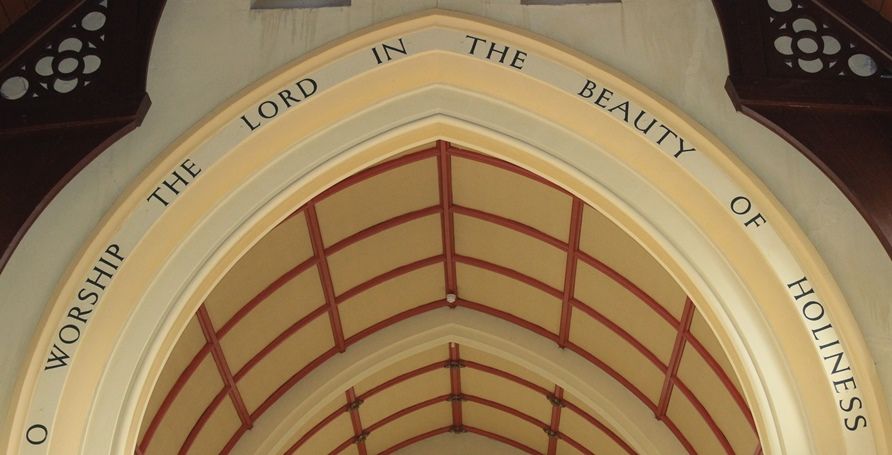The beauty of holiness

“O worship the Lord in the beauty of holiness” (Psalm 29:2)
The church where I work has a Bible verse as a part of its architecture. Written on an arch at the front of the church, in large letters over the head of whoever is preaching, are these words from Psalm 29 verse 2: “O worship the Lord in the beauty of holiness” – or in a newer translation – “Worship the Lord in the splendour of his holiness.”
Members of our church would have seen those words every time they enter the church building. They would have read them countless times over the years and their eyes would have drifted up to them time and again during a boring sermon. They are familiar words to anyone familiar with our church. Yet however familiar, they are still strange. They bear thinking through and figuring out.
‘Worship the Lord’ I would imagine we can understand. And worshipping in splendour or beauty seems to connect well too. But then comes that word ‘holiness’. How is holiness ‘beautiful’ or ‘splendid’? And how does holiness lead us to worship?
I wonder what comes to mind when you think about the word ‘holiness’? For me, I naturally think of a standard of living which I fail to meet on a regular basis. An ideal which we aspire to but know we don’t measure up to more often than not. That can often be our idea of holiness. But that struggle to be holy seems far from beautiful and probably doesn’t feel like it fuels worship. More importantly, it doesn’t describe God’s holiness.
You probably know that the word holiness simply means ‘set apart’, ‘separate’, ‘different’. To be holy means to be different. For us, it means lives and attitudes that are different from the world around us. But God is also holy, which means he is separate and set apart from his creation.
Consider the Queen for a moment. There is a sense in which the Queen is ‘holy’. She is separate and set apart from the rest of us for a particular purpose. She lives in a palace and we can’t just walk up to her as we might do most other people on the planet.
Our God is holy because he is different from us. The rest of the psalm really focuses on this. He has glory and strength far above any earthly being. He controls the wind and the storm, the seas and the forests. He is powerful and majestic. He is enthroned as king over all things. He is vastly, immeasurably different from us.
That should lead us to worship. Worship the Lord in the splendour of his holiness, commands the Psalm. As we see the might and majesty of God, especially in nature, we should see the beauty and splendour of God. And we should worship.
But there is more. There is more than even David, the author of the psalm, knew. There is more to lead us to worship.
Because this mighty and majestic God, so different from us, became one of us. God the holy one became a human being. He is set apart from us but stepped in to be with us in Jesus Christ. Not only that, but he died on a cross; the Holy One enthroned on high was executed as a criminal. He did that so we could be forgiven. He did that so we could be restored. He did that so we could be made holy.
In Jesus we see a holy God who comes to be with the unholy. That is a strange and splendid, mysterious and beautiful holiness. It is a holiness that leads us to marvel and wonder, and then to worship. To see the God who laid down his holiness to make us holy and forgiven people. Then to worship the Lord in the splendour and beauty of that wonderful holiness.
Photo by Keith Nurse
